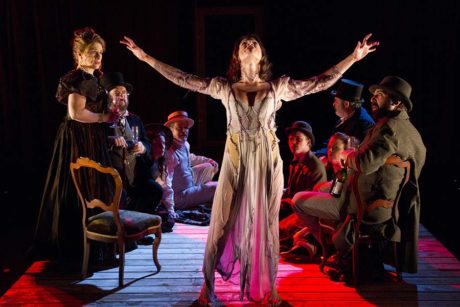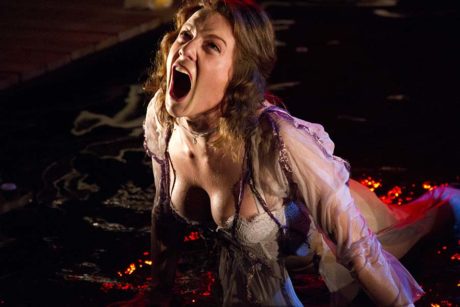Anton Chekhov’s The Seagull is one of the most durable of all 19th century plays. But it’s a play that producers, directors, and playwrights love to tinker with. In the last few years, audiences in Philadelphia and New York have been presented with updated rewrites of the work (including a musical version) rather than the original.

EgoPo Classic Theater’s production of The Seagull goes back to the source, giving us Chekhov in a production that straddles the old and new. The translation by Paul Schmidt generally uses formal language, but with modern vernacular phrases (“I suppose it’s just my ego talking”) sprinkled in. The costumes by Rita Squitiere, with vests and bow ties for the men and long skirts for the women, firmly place us in 1896 Russia. But director Lane Savadove makes some bold choices in his staging – choices that take the story far from the drawing-room milieu you might associate with Chekhov.
The Seagull takes place on a vast lakeside estate in the Russian countryside where the characters contemplate their place in the universe. These people are desperately searching for fulfillment, sometimes through their work, sometimes through art, but principally through romance. There are several romantic triangles at play here, and even though some of the characters get what they want in the end, nobody ever seems contented. Konstantin (Andrew Carroll) wants to be a successful writer, Nina (Anna Zaida Szapiro) wants to be a successful actress, and Konstantin wants Nina. But Nina longs for Trigorin (Ed Swidey), already a successful writer, who is involved with Arkadina (Melanie Julian), a successful actress (and Konstantin’s mother). Meanwhile, estate manager Shamrayev (Mark Knight) is married to Paulina (Kirsten Quinn), who is in love with the neighborhood doctor Dorn (Eric Kramer); and Masha (Stephanie Iozzia), daughter of Shamrayev and Paulina, is pursued by the meek schoolteacher Medvedenko (Dane Eissler) even though she’s in love with Konstantin (remember him?). Arkadina’s infirm brother Sorin (Aaron Cromie), the owner of the estate, sits and observes it all with a resigned air.
But there’s something new this time around: instead of mostly taking place in a house by a lake, this version of The Seagull mostly takes place, well, in the lake. Scenic and lighting designer Thom Weaver has created a pool that takes up most of the playing space on the second floor of the Latvian Society, with a narrow wooden deck surrounding it. In the middle of the pool is a wooden platform where most of the dialogue is performed. And while the water is only an inch or two deep, the effort that the characters make to accommodate it – stepping on narrow flagstones to navigate to the platform, or sloshing through the water itself – ends up dominating every scene.

Weaver’s design immerses the viewer in a unique environment. Theatergoers are greeted by Konstantin in the downstairs bar at the Latvian Society, then led upstairs – through a “garden path” surrounded by branches and paper lanterns – and around the deck on the perimeter of the stage to their seats.
While it looks captivating, The Seagull is hampered at times by being a big production in a small space. The constricted pathway forces the audience to progress in single file, which makes entry and exit into the theater awkward and time-consuming. (The narrow rows in the bleachers, which make moving to seats at the end of a row difficult, contribute to the problem.) The long queues before and after the show, and during intermission, add about half an hour to the evening’s length.

But the audacious design allows the audience to see the characters in a new light. As the characters struggle to get around (and through) the pool, they struggle with forces they seem powerless to control. And in a play that has its roots in symbolism (what does that seagull represent, anyway?), their battle with the encroaching water seems highly appropriate. During the play’s final section, as the characters’ lives start to careen out of control, the water ends up playing an even more crucial role than before.
Savadove’s production emphasizes the humor in Schmidt’s translation, much of it supplied by Cromie’s crusty Sorin, Knight’s Cockney-accented Shamarayev, and Iozzia’s glowering, black-clad Masha. But it also has moments of haunting beauty. Szapiro’s Nina, wearing mostly white during the early scenes, provides an ethereal contrast to the gloomy Masha. And Szapiro gives a lucid, raw performance of the play-within-a-play in act one. Her collapse into despair later in the play is haunting and heartbreaking.
All the performances are excellent. Carroll’s sullen take on Konstantin conveys all the pain of a being a tortured, misunderstood artist. As his mother – the demanding, theatrical diva Arkadina – Julian makes the character so harsh and disagreeable that, for once, it’s easy to sympathize with every one of Konstantin’s complaints. And Swidey’s performance as Trigorin, shows the agony of an author who is simultaneously frustrated, bewildered, and exhilarated by his own celebrity.
Savadove’s ambitious production, filled with strong performances and remarkable design, makes this a Seagull to remember.
Running Time: Two hours and 40 minutes, including intermission.
The Seagull plays through February 19, 2017 at EgoPo Classic Theater, performing at The Latvian Society of Philadelphia – 531 North 7th Street, in Philadelphia, PA. For tickets, call the box office at (267) 273-1414, or purchase them online.




